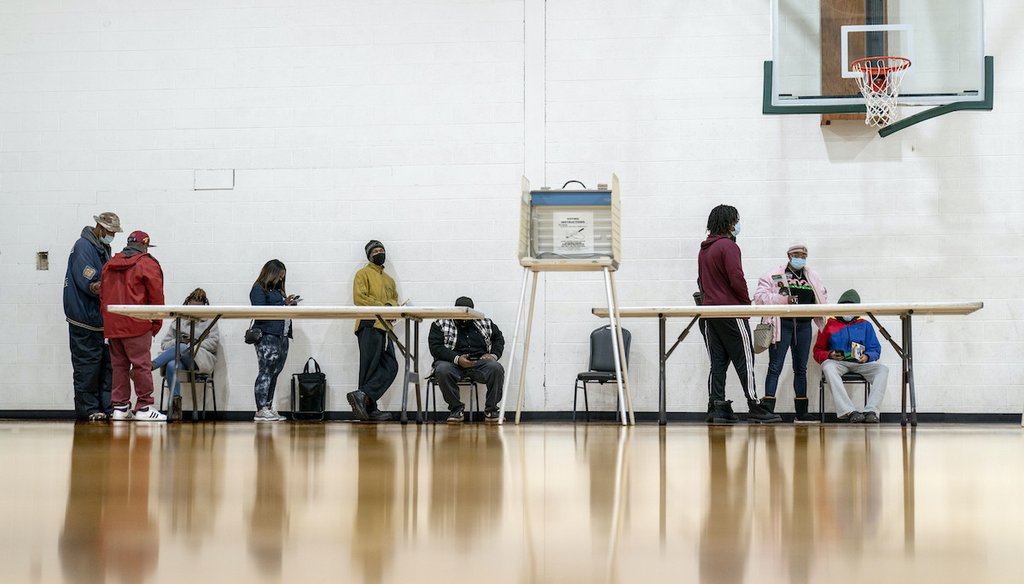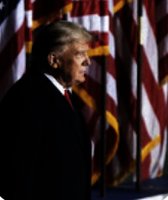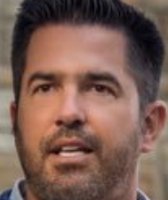Stand up for the facts!
Our only agenda is to publish the truth so you can be an informed participant in democracy.
We need your help.
I would like to contribute

Voters wait in line to fill out a ballot on the last day of early absentee voting before the general election at the Northwest Activities Center in Detroit, Monday, Nov. 2, 2020. (AP)
If Your Time is short
- A Facebook post claims that new legislation proposed by Democrats would destroy future elections. The criticism targets provisions in the bill related to voter eligibility, voting by mail and voter registration.
-
The sweeping legislation includes provisions to require states to enact automatic and same-day voter registration and make it easier to obtain a mail ballot. It also has provisions to increase transparency in campaign financing.
-
The post goes too far in many assertions by either omitting context or being outright misleading.
A Facebook post claims Democratic legislation is aimed at protecting the Washington establishment and is anti-American, but the post’s claims don’t add up.
HR 1, called the For the People Act, is a bill that folds together previous proposals for absentee voting, in-person voting, campaign finance and ethics. Democrats say the goal of the legislation is to make it easier for everyone to vote.
The Jan. 25 Facebook post says otherwise. It says the For the People Act will "permanently destroy voting in America." The post states that the legislation is a "direct attack promising the destruction of the Constitutional Republic."
The Facebook post reduces the sweeping legislation, which is hundreds of pages long, into brief phrases that distort the law’s provisions on rules for voter eligibility, voter registration and voting by mail.
The post makes alarmist claims, such as that murderers will be allowed to vote, and broad generalizations suggesting that the bill will lead to regulation of freedom of speech. While the post doesn’t use the phrase "voter fraud", it leaves readers with the misleading impression that the bill aims to weaken election security. The bill actually includes provisions to increase security through grants and cybersecurity improvements.
The legislation has faced pushback from conservatives who see it as overstepping states’ rights. In the past, states have set most details of election laws.
While the legislation overall is seen as Democrats’ wishlist to expand access to the ballot, the Campaign Legal Center found that it includes several policies that have been supported by state officials in red states or backed by Republicans in Congress.
For example, the legislation includes provisions to require states to enact automatic registration and same-day registration, which is already the policy in many states. The legislation also has provisions to increase transparency in campaign finance and close dark-money loopholes.
While Democrats are pushing for national changes on the voting front, Republican lawmakers in many states are drafting legislation that could add hurdles to voting by mail.
Here’s our fact-check of the descriptions in the Facebook post about HR 1:
"Nationwide mail-in voting"
This lacks context. The bill does not mandate voting by mail, but it aims to make it easier for voters to cast ballots by mail if they wish. For example, the bill says that states can’t require a voter to provide an ID to vote by mail or require notarization or witnesses of voters’ signatures to cast an absentee ballot. But states can still set some rules, such as deadlines to request a ballot. Some states already operate largely mail-in voting elections, or expanded mail-in voting during the pandemic.
"Legalized limitless ballot harvesting"
This is misleading. "Ballot harvesting" isn’t an official legal term, but it generally refers to someone collecting absentee ballots on behalf of others and then submitting them. The Facebook post omits that many states already allow individuals to collect ballots on behalf of others, although some impose certain restrictions.
The bill says that states "shall permit a voter to designate any person" to return their sealed absentee ballot, as long as the person doesn’t get paid based on the number of ballots returned. It would prevent states from putting a limit on how many ballots any person could return on behalf of others.
"Prohibits attempts to clean voter rolls"
This is wrong. Nationwide, election officials regularly remove voters from the rolls who are ineligible, in part with help from a national consortium that shares information with states about voters who moved, or died or have duplicate registrations. But some ineligible voters have remained on the rolls, and in other cases election officials have wrongly purged otherwise valid voters.
The bill attempts to improve the process of maintaining accurate lists. The legislation calls for "standards governing the comparison of data for voter registration list maintenance purposes" and that standards must be public and applied in a uniform and nondiscriminatory manner.
The legislation also states that no person, other than a state or local election official, shall submit a formal challenge to an individual’s eligibility to vote unless that challenge is supported by personal knowledge. Critics of the bill have viewed this section as a way to halt efforts by outside groups that have challenged the eligibility of voters on rolls in many states. The legislation doesn’t ban such challenges, but includes criteria that written challenges must be subject to an oath or attestation under penalty of perjury.
"Murderers and rapists can vote"
This is an exaggeration. The bill doesn’t expressly mention murderers or rapists, but it does state that citizens convicted of a crime shall still be allowed to vote "unless such individual is serving a felony sentence in a correctional institution or facility at the time of the election."
This means that murderers and rapists serving lengthy prison sentences would not get to vote unless and until they get out of prison. Currently, many states allow felons to vote after they have completed their sentences, although the particular rules vary. Only Vermont and Maine allow inmates to vote.
"Internet-only registration with electronic signature"
This is wrong. The bill does not mandate internet-only registration, but it does promote the option. The bill would require each state to offer an online application for voter registration. The majority of states already offer online voter registration, according to the National Conference of State Legislatures.
For signatures, the legislation states that an individual who has a signature on file with a state agency, such as the motor vehicle office, could consent to transfer that electronic signature. If that’s not the case, then the individual would submit an electronic copy of their handwritten signature.
"Banning voter registration requirement of full" Social Security Number
This omits context. The bill calls for amending the National Voter Registration Act of 1993 to only require the last four digits of an individual’s Social Security Number to register to vote. The majority of states’ voter registration forms already only require the last four digits of an individual’s Social Security number.
The Help America Vote Act of 2002 requires new registrants to provide either their drivers license number or the last four digits of their Social Security Number, to confirm their identity. If a registrant offers neither, they are required to offer another form of identification when voting for the first time, said David Becker, executive director of the Center for Election Innovation & Research.
A minority of voters currently provide their full Social Security Number to register to vote since most use their driver's licenses to register, said Myrna Pérez, director of the Brennan Center's Voting Rights and Elections program.
Nationwide same-day registration
This is accurate. Some states already offer same-day voter registration, which allows individuals to cast a ballot on the same day they register. The bill would mandate that states allow any eligible individual on the day of a federal election to register to vote and cast a ballot. If the individual is already registered, it would allow an individual to revise their voter registration information.
"Banning voter ID"
This is partially accurate. The legislation doesn’t expressly ban voter ID, but it does include a work-around for voters that already exists in some states. The bill calls state voter ID laws "excessively onerous."
The bill says that if a state has a requirement for an individual to present an ID to cast a ballot, the state shall permit the individual to present to election officials a sworn written statement under penalty of perjury attesting to the individual’s identity and that they are eligible to vote.
"This is actually a common practice used in several states, and since the vast majority of voters have identification and carry it with them, it is rarely used. But this alternative can be important for those few eligible voters that might have difficulty meeting restrictive identification requirements," Becker said.
"Congressional take over of redistricting"
This is an exaggeration, experts on redistricting said. The bill states that Congress can establish the conditions states must follow in carrying out congressional redistricting including to create independent redistricting commissions. Some states already use commissions to carry out redistricting or advise state legislatures.
"It’s a congressional directive in how states would conduct redistricting," but Congress itself would not take over drawing the lines, said Jeffrey Wice, adjunct professor at New York Law School and long-time counsel to the New York State Legislature.
"16-year-old voter age"
This is wrong. The bill says that states must accept an individual’s application to register to vote if the individual is at least 16 years old. However, it also states that nothing in that provision "may be construed to require a state to permit an individual who is under 18 years of age at the time of an election for federal office to vote in the election."
This process is known as "preregistration" and is already allowed in some states for individuals who are 16 or 17. Some states also permit 17-year-olds to vote in primary elections, if they will turn 18 before the general election.
"Regulates freedom of speech" and "aims to eliminate anonymous speech"
This part is murkier to fact-check.
These statements could refer to any one of a number of provisions, including the ban of deceptive audio or photos of candidates and a ban on knowingly making false statements about a federal election.
Clay Calvert, a University of Florida communications professor and expert on the First Amendment, said the parts of the bill targeting the dissemination of deceptive speech raise First Amendment questions about freedom of expression. If enacted into law and challenged in court, the government would need to prove those parts of the law serve a compelling interest and were narrowly drafted.
The bill aims to limit dark money in politics, including a requirement to disclose donations over $10,000 to politically active nonprofits. It also calls for online ads to be transparent and include disclaimers.
A former policy analyst at the conservative Heritage Foundation concluded in an analysis of the 2019 bill that it represented "a serious threat to the freedom of speech."
But if the bill were to become law, it wouldn’t prevent candidates or politicians from speaking in support of or against a candidate, or on policy issues, said Brendan Fischer, who works for the Campaign Legal Center which supports the legislation.
Those restrictions on dark money would apply to Democrats, too. Continuing a trend from the 2018 midterms, liberal dark money groups spent more than their conservative counterparts in 2020, the Center for Responsive Politics found shortly before the election.
"DC statehood"
This is accurate. The bill includes a finding in favor of statehood for the District of Columbia.
"The 705,000 District of Columbia residents deserve voting representation in Congress and local self-government, which only statehood can provide," it says. "There are no constitutional, historical, fiscal, or economic reasons why the Americans who live in the District of Columbia should not be granted statehood."
Spot a claim on social media or by a politician about voting rights or election laws we should fact-check? Email [email protected].
Our Sources
Facebook post, Jan. 25, 2021
Congress.gov, H.R.1 - For the People Act of 2021, Introduced Jan. 4, 2021
Congress.gov, HR 1 For the People Act of 2019, Introduced Jan. 3, 2019
Campaign Legal Center, The Bipartisan Origins & Impact of the For the People Act (H.R. 1/S. 1) Jan. 25, 2021
Campaign Legal Center, For a More Accessible, Transparent and Responsive Government, CLC’s Trevor Potter Encourages Congress to Pass the "For the People Act," Jan. 4, 2021
Campaign Legal Center, How H.R. 1 Will Help Us Achieve a Government for the People, Jan. 4, 2021
Center for Responsive Politics, Democrats prioritize campaign finance overhaul with ‘For the People Act’ Jan. 21, 2021
CNN, False fraud claims fanned Capitol riot. Now they're fueling GOP efforts to restrict voting, Jan. 12, 2021
National Conference of State Legislatures, Preregistration for Young Voters, Feb. 12, 2019
National Conference of State Legislatures, Absentee and Mail Voting Policies in Effect for the 2020 Election
National Conference of State Legislatures, Voter List Accuracy, March 20, 2020
National Conference of State Legislatures, Voter Identification Requirements | Voter ID Laws, Aug. 25, 2020
National Conference of State Legislatures, Online Voter Registration, Oct. 22, 2020
National Conference of State Legislatures, Felon Voting Rights, Jan. 8, 2021
Heritage Foundation, The "For the People Act" Demonstrates the Flaws of Progressive Campaign Finance Reform, Dec. 4, 2020
Brennan Center for Justice, Annotated Guide to the For the People Act of 2021, Jan. 20, 2021
Election Assistance Commission, Register To Vote In Your State By Using This Postcard Form and Guide
PolitiFact, House Democrats and HR 1: Voting rights expansion or federal power grab? Feb. 8, 2019
PolitiFact, Bernie Sanders set off a firestorm over prisoners voting, but his facts are straight, April 24, 2019
Email interview, Daniel Jacobs, spokesperson for U.S. Rep. John Sarbanes, D-Maryland, Feb. 1, 2021
Email interview, Jon Eguia, Michigan State University economist, Jan. 28, 2021
Email interview, Anna Massoglia, investigative researcher, Center for Responsive Politics, Jan. 27, 2021
Telephone interview, Brendan Fischer, Campaign Legal Center director of federal reform, Jan. 27, 2021
Telephone interview, Myrna Pérez, director of the Brennan Center's Voting Rights and Elections, Jan. 28, 2021
Email interview, David Becker, executive director of the Center for Election Innovation & Research, Jan. 28, 2021
Email interview, Justin Levitt, Loyola law school professor, Feb. 1, 2021
Telephone interview, Jeffrey Wice, adjunct professor at New York Law School and long-time counsel to the New York State Legislature, Feb. 1, 2021
Email interview, Clay Calvert, a University of Florida communications professor and expert on the First Amendment, Jan. 28, 2021




































